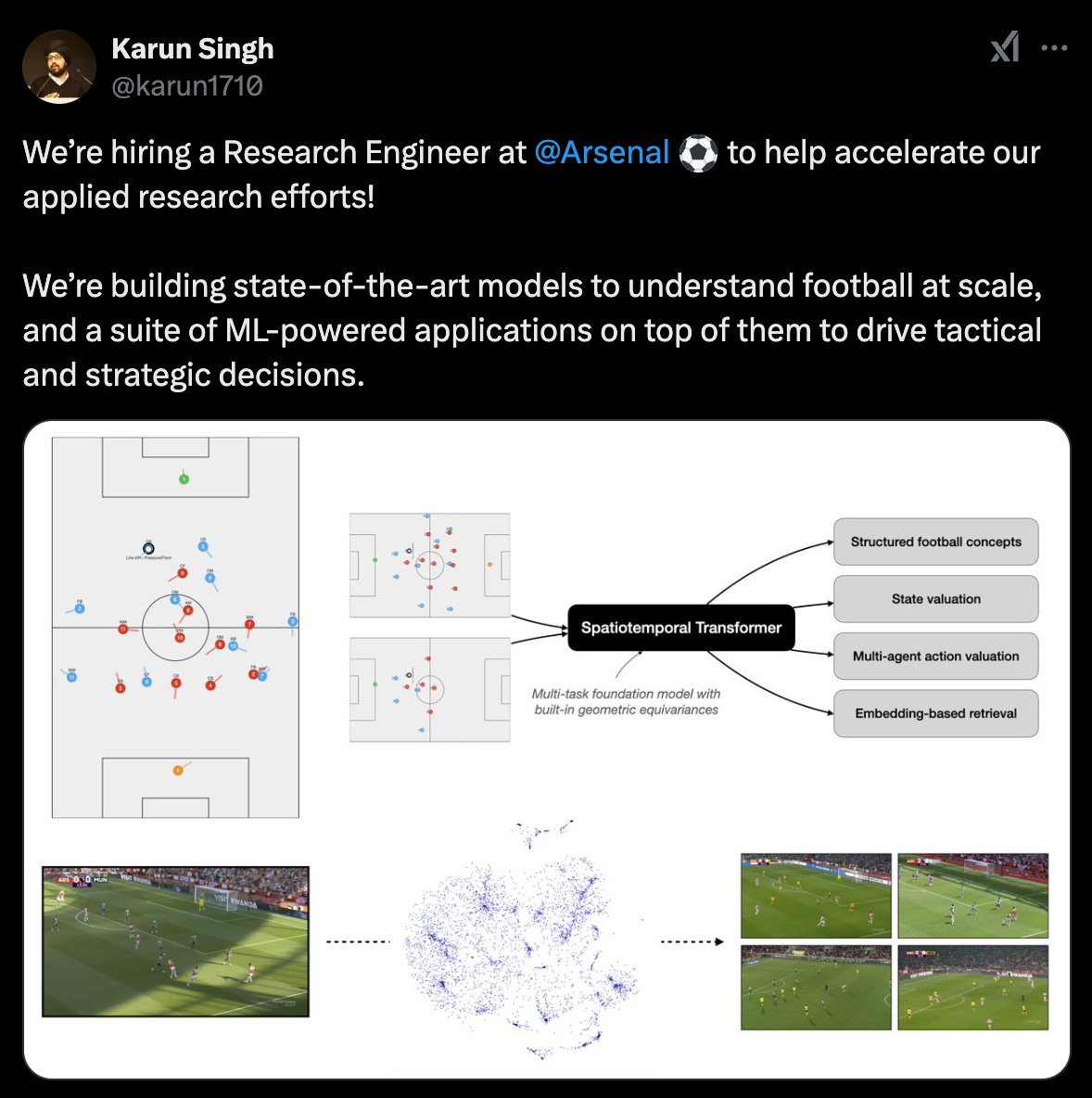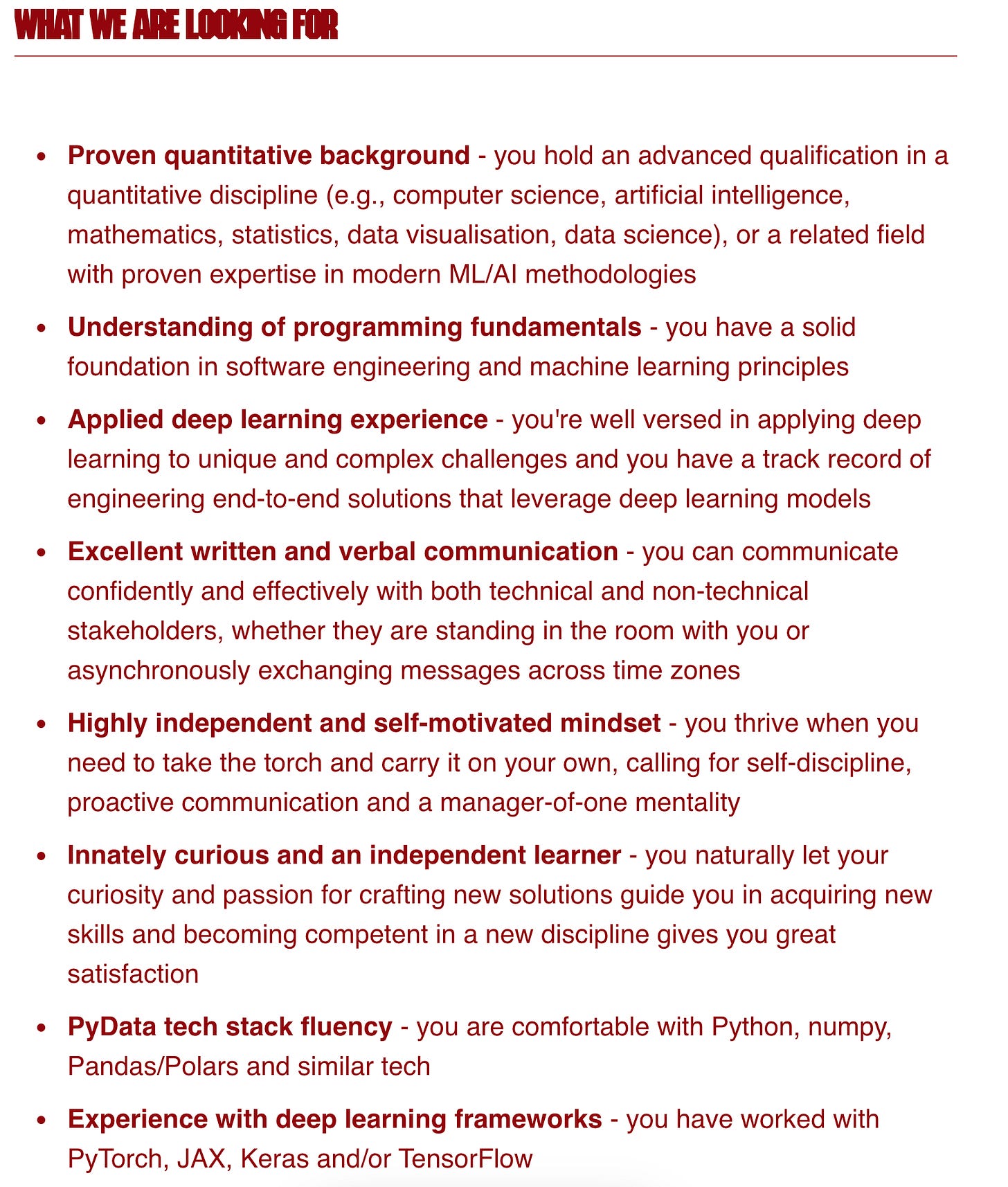How Much Do You Actually Need to Know?
On Friday (Jan 24th, 2025), the research team for Arsenal sent out a job posting for a new research engineer with the club.
To be honest, when I set out to learn and do sports analytics, this was the type of job I dreamt of doing. Working on advanced models that were leading the forefront of research and impacting teams and organizations at the highest level.
Some people expressed concern to me about the level of skill that is required in the job post and I can see where they are coming from. It’s a very technical job.
But the thing that a lot of people don’t realize is that this job is just one of the many things you can do in sports analytics. They aren’t all this advanced and there are plenty of opportunities for people who are beginners to advanced levels.
So let’s dive into what I believe should be your bare minimum requirements for working in sports or even just data careers in general.
1. Coding
I’ve tried my best to communicate this over the years, but if you want to work in sports analytics you need to know how to code. You should know:
Python or R
SQL
Python and R allow you to analyze data efficiently, while SQL allows you to interact with databases. All important parts of working with data.
More and more I’m starting to believe that you should just learn Python and SQL as Python offers more opportunities, but you should know at least one of the two.
If you don’t know how to code, you’ll get looked over for basically any sports analytics or data job. Make sure that you have this locked down and are proficient in coding and you’ll be a much more qualified candidate.
A lot of people want to start with the fancy tech or advanced machine learning models, but I would recommend against it. Learn the basics and really solidify yourself with code and you’ll stand out amongst others who might be competing for the same job.
2. Math
With advancements in AI, I am starting to do a 180 on my recent position that math was going to become obsolete to the general public, to now I think that math is a very important skill set to have, especially when working in different data fields or more specialized machine learning fields.
Math really helps bring it all together and having a basic understanding of math and different types of math is going to become even more important.
You should have at least base knowledge in:
Statistics & probability
Algebra (some linear algebra as well like understanding matrices)
Knowing how to use these and how to apply them will help you truly understand data, different models, and how to apply them effectively.
You don’t need to be a math wizard, but base understandings should be a minimum.
3. Degrees & Certifications
Formal education is starting to become less and less important and companies are hiring the best person for the job.
You can probably get by without any sort of degree for normal software and data jobs. Just know that it will be a little bit harder to get recognized and you will need to be a cut above the rest.
For sports analytics or more specialized/niche jobs, it seems that they require degrees since the jobs are very competitive. A lot of companies and organizations still do use them to filter through an influx of applications they will get sometimes though. Especially in a job like the one above, which is very research-heavy.
I’m of a mixed opinion on when people ask me if they need a degree or an advanced degree of some sort, because mostly it depends on the job and the person.
If it’s possible for you, I would still recommend getting a degree, (don’t take this as financial advice haha) as right now it will still help you have an advantage when it comes to getting in the door.
You always can do different courses, like my Python and Football Analytics course, and any certifications to improve your knowledge which is a key part of continuous learning.
4. Communication
Imagine you are working on a machine learning model and you’ve just discovered that it has a very high accuracy, the different metrics look good, and in tests it’s getting really good outputs.
You take it to the CEO of the company who isn’t technical and give them all the numbers and they just say ok and then your model doesn’t get approved since they don’t understand its value.
Being able to simply communicate different key insights is a very underrated skill, especially in sports where most of the time you will be one of the few who actually understands the data points.
It’ll be a shock when you try to present a graph with a lot of metrics to a nontechnical person and you get blank and confused faces. This has happened to me multiple times in my career as I’ve worked on projects and had to present the findings to someone who isn’t technical and my results have been met with blank stares.
You’ll need to learn to communicate simply, and the easiest way I’ve found to practice is through writing. If you can write it you can get your thoughts out and then keep refining it until it is simple yet effective.
A lot of people don’t practice communication and end up being looked over for jobs because they can’t show what they know effectively.
There’s a lot of different things to know and understand but these previous four should be your minimum for working in data or sports analytics.




Thanks for this post, man. Saw the job posting when you retweeted it, and I like how you take something like that and weave it into a story, a idea to learn from.
As always you keep things simple and straight to the point. Thanks again.
Any website where we can find more opportunities like this??